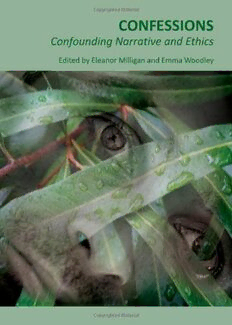
Confessions: Confounding Narrative and Ethics PDF
Preview Confessions: Confounding Narrative and Ethics
Confessions Confessions: Confounding Narrative and Ethics Edited by Eleanor Milligan and Emma Woodley Confessions: Confounding Narrative and Ethics, Edited by Eleanor Milligan and Emma Woodley This book first published 2010 Cambridge Scholars Publishing 12 Back Chapman Street, Newcastle upon Tyne, NE6 2XX, UK British Library Cataloguing in Publication Data A catalogue record for this book is available from the British Library Copyright © 2010 by Eleanor Milligan and Emma Woodley and contributors All rights for this book reserved. No part of this book may be reproduced, stored in a retrieval system, or transmitted, in any form or by any means, electronic, mechanical, photocopying, recording or otherwise, without the prior permission of the copyright owner. ISBN (10): 1-4438-1920-4, ISBN (13): 978-1-4438-1920-6 TABLE OF CONTENTS List of Illustrations....................................................................................vii Introduction.................................................................................................1 Section One: Narrative Method Chapter One.................................................................................................5 Creative, Expressive Encounters in Health Ethics Education: Ethics as Relational Engagement Eleanor Milligan and Emma Woodley Chapter Two..............................................................................................25 We Don’t Ask Enough of Art – Sheep, Art and Ethics Libby Woodhams Chapter Three............................................................................................35 Identity Pragmatics: Narrative/Identity/Ethics David Massey Chapter Four..............................................................................................67 Configuring the Researcher’s Identity through Narrative Research: A Researchers Story Jennifer Jones Chapter Five..............................................................................................81 Hearing Moral Tension in Narrative Research using “the Listening Guide” Eleanor Milligan Interlude ‘Seeing’ and ‘Speaking’ .........................................................................101 Paul Hurley Echoes of Life: The Departure and Destination of a Dream....................103 Margaret Haselwood vi Table of Contents Section Two: Narrative Vulnerability and Ethics Chapter Six..............................................................................................121 Ontology, Narrative, and Ethical Engagement Peter Isaacs Chapter Seven..........................................................................................143 Torture and Narrative: An Absolute Violation of the Self Richard Matthews Chapter Eight...........................................................................................161 Narrative and Ethics in the Literary Hermeneutics of Paul Ricoeur: An Exploration within the Context of Professional Health Care Education Andrew McKie Chapter Nine............................................................................................181 Toward a Narrative Understanding of Suicide Scott Fitzpatrick Chapter Ten.............................................................................................197 Music as [More Than] Narrative Naomi Sunderland and Andy Arthurs Contributors.............................................................................................215 Index........................................................................................................219 LIST OF ILLUSTRATIONS Title Page Number Figure 2.1 “Metaphor Becomes 27 Reality” by Margaret Haselwood Figure 2.2 “Dogs and Utes” by 28 Jim Moll Figure 2.3 “Skirting the Fleece” 29 by Christine Porter Figure 2.4 “Blue Lines” by Rob 29 Simcocks Figure 2.5 “Old Cracker Ewes 30 (Dressed for the Kill)” by Tom Spence Figure 2.6 “Maggots” by Libby 32 Woodhams Figure 3.1. Panel members on 41 ABC television program ‘Q and A’. May, 2009. INTRODUCTION To confess, in the general sense of the word, is to acknowledge, avow, admit or concede. Confessions allude to revelations – ready and reluctant, coherent and confused – that seek to make some sense of things for the teller and the listener alike. In research that considers narratives, storytelling may be experienced as a kind of ‘confession’, for both the participants and the researchers. For the participants, this may be a confession of things previously unrealised or unarticulated. For the researchers, in their conversations about the problems and processes of narrative research, their own confessions merge with the confessions of others to guide, illuminate and possibly confound the research journey. As ‘confessions’ make sense of and shape the world around us – in the telling, the receiving, and the interpretation and re-interpretation, the range of papers within this volume seeks to make some sense of the complexities that shape the dynamic relationship between narrative, ethics and research. The word “confounding”, has a similarly inviting ambiguity in its definition that might broaden and deepen the scope of our discussions about narrative and ethics. The Oxford English Dictionary defines ‘confounding’ as: (cid:129) defeating utterly, bringing to ruin, destroying (cid:129) discomfiting, abashing, putting to shame (cid:129) surprising or confusing, losing presence of mind (cid:129) mixing up or mingling so that the elements become difficult to distinguish or impossible to separate Without limiting or prescribing the interpretations that may be made from these definitions, there is an enormous richness in thinking about how the act of ‘confession’ may challenge, affront, surprise and indeed entangle our ability to make meaning of the ethical aspects of narrative research- both in its subject matter and processes. Could we argue that some narratives undermine ethical engagement? Or perhaps we may note that confession, in the form of story telling, can often surprise or confuse us in our analysis. Indeed, we may be invited to think, how we can tease apart
